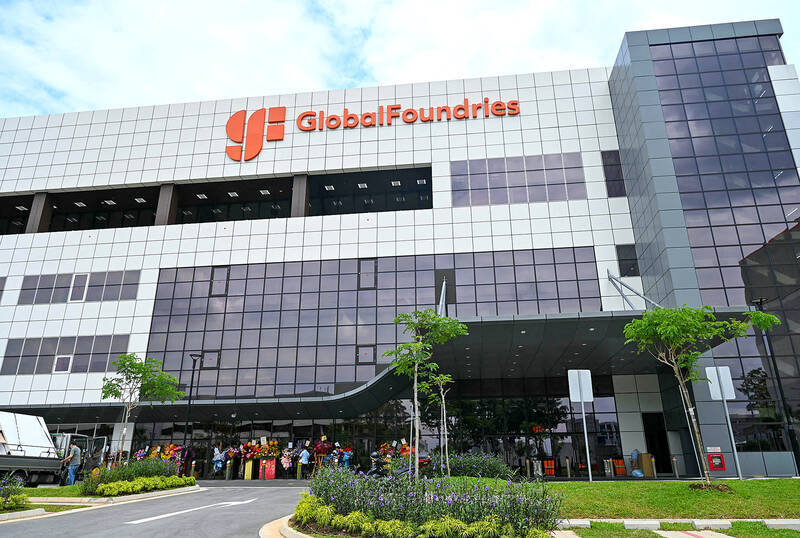The world’s third-largest contract chipmaker, GlobalFoundries Inc, yesterday opened a US$4 billion manufacturing plant in Singapore as part of a global expansion to help ease an industry supply crunch.
The facility would produce an additional 450,000 wafers annually at full capacity by 2025 to 2026, GlobalFoundries Singapore senior vice president and general manager Tan Yew Kong (陳耀光) told reporters, raising the city-state’s overall capacity to 1.5 million wafers per year.
The chips, usually used in smartphones and other mobile devices, are also increasingly in demand by automakers, especially for electric vehicles, adding to pressure to raise production.

Photo: AFP
“The key megatrends of our industry — digitalization, connectivity, cloud computing — are all driving acceleration to a more connected and data-centric world,” GlobalFoundries president and CEO Thomas Caulfield said at the launch.
“It demonstrates how central and critical the industry is to the world economy, and how pervasive semiconductors are in enabling and enhancing all aspects of human life,” he said.
Despite economic headwinds, the company expects the industry to double in the next decade, Caulfield said, adding: “The catalyst for this growth will be AI [artificial intelligence].”
The firm’s 23,000m2 Singapore facility, which broke ground in 2021, would boost the global footprint of the company, which already has plants in the US and Europe.
Singapore’s chip output makes up 11 percent of the global semiconductor market.
The global semiconductor market is predicted to experience a downturn of 10.3 percent this year, but recover next year and grow 11.8 percent, industry monitor World Semiconductor Trade Statistics has said.

On Ireland’s blustery western seaboard, researchers are gleefully flying giant kites — not for fun, but in the hope of generating renewable electricity and sparking a “revolution” in wind energy. “We use a kite to capture the wind and a generator at the bottom of it that captures the power,” said Padraic Doherty of Kitepower, the Dutch firm behind the venture. At its test site in operation since September 2023 near the small town of Bangor Erris, the team transports the vast 60-square-meter kite from a hangar across the lunar-like bogland to a generator. The kite is then attached by a

Foxconn Technology Co (鴻準精密), a metal casing supplier owned by Hon Hai Precision Industry Co (鴻海精密), yesterday announced plans to invest US$1 billion in the US over the next decade as part of its business transformation strategy. The Apple Inc supplier said in a statement that its board approved the investment on Thursday, as part of a transformation strategy focused on precision mold development, smart manufacturing, robotics and advanced automation. The strategy would have a strong emphasis on artificial intelligence (AI), the company added. The company said it aims to build a flexible, intelligent production ecosystem to boost competitiveness and sustainability. Foxconn

Leading Taiwanese bicycle brands Giant Manufacturing Co (巨大機械) and Merida Industry Co (美利達工業) on Sunday said that they have adopted measures to mitigate the impact of the tariff policies of US President Donald Trump’s administration. The US announced at the beginning of this month that it would impose a 20 percent tariff on imported goods made in Taiwan, effective on Thursday last week. The tariff would be added to other pre-existing most-favored-nation duties and industry-specific trade remedy levy, which would bring the overall tariff on Taiwan-made bicycles to between 25.5 percent and 31 percent. However, Giant did not seem too perturbed by the

TARIFF CONCERNS: Semiconductor suppliers are tempering expectations for the traditionally strong third quarter, citing US tariff uncertainty and a stronger NT dollar Several Taiwanese semiconductor suppliers are taking a cautious view of the third quarter — typically a peak season for the industry — citing uncertainty over US tariffs and the stronger New Taiwan dollar. Smartphone chip designer MediaTek Inc (聯發科技) said that customers accelerated orders in the first half of the year to avoid potential tariffs threatened by US President Donald Trump’s administration. As a result, it anticipates weaker-than-usual peak-season demand in the third quarter. The US tariff plan, announced on April 2, initially proposed a 32 percent duty on Taiwanese goods. Its implementation was postponed by 90 days to July 9, then